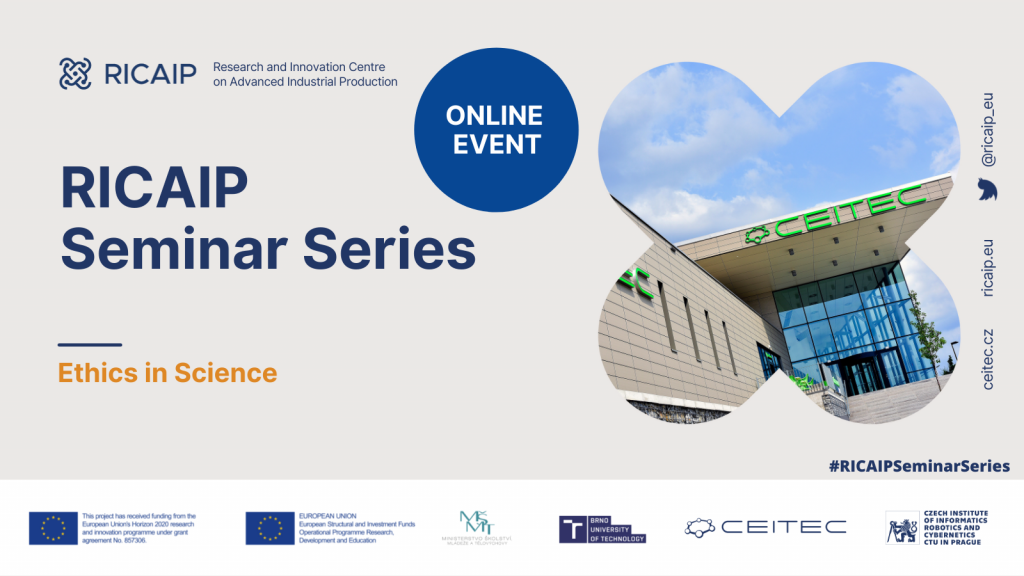Datum / čas
Date(s) - 31.03.
9:00 - 12:00
Kategorie ne Kategorie
RICAIP Seminar Series: Ethics in Science
31 March 2022 | 9:00 am – 12:00 pm
More information: https://ricaip.eu/event/ricaip-seminar-series-ethics-in-science/
Register HERE – the link to the online stream and to the discussion platform will be sent to your e-mail before the event.
Science is a service to society. Ethical principles must be respected in order for society to be able to trust research activities and the conclusions of scientific work. Our three inspiring speakers will open research integrity topics, increasing trust in science connected with preventing fabrication, falsification, plagiarism; and ethical questions associated with technology transfer: „science vs money“.
PROGRAM:
9:00 – 9:10
INTRODUCTION by prof. Pavel Václavek (CEITEC Brno University of Technology)
9:15 – 10:00
TALK: Research integrity in the European context by prof. Pere Puigdom (Research Professor CSIC. CRAG. Barcelona. Spain. Member of the Science and Ethics Working Group ALLEA)
Scientific Integrity is essential for the development of scientific research, its quality and its credibility. For this reason, research organizations and individual scientists should be aware of the conditions that define the scientific endeavor. This is why codes of good scientific practices have been approved by University, scientific Centers, and funders of research. One example is the European Code of Conduct for Research Integrity written by ALLEA and that has been adopted as a reference by the European Commission for its activities of research funding. The European Code includes guidelines of procedures that may be followed in cases of misconduct.
10:00 – 10:45
TALK: Causes, consequences and prevention of scientific misconduct by Dr. Tomaš Foltýnek (Masaryk University of Brno, Faculty of Informatics)
Academic integrity is often perceived as an effort aiming to prevent academic misconduct. Specifically, research integrity recognises three cardinal sins known as FFP: Fabrication, falsification, plagiarism. The lecture provides examples of specific cases and their consequences, namely for the trust in science. We will discuss the causes of academic misconduct and measures that research institutions may adopt to prevent misconduct. The lecture ends with the definition of academic integrity as a commitment to positive values and argues that integrity is an inherent part of research quality.
11:00 – 11:45
TALK: Questions of Ethics in Technology Transfer by Mgr. Matej Kliman ( Legal and methodical consultancy in R&D funding, intellectual property management, technology transfer)
- Technology transfer and Money. Financial and non-financial aspects in Technology Transfer. Which is more important? How much money should we ask for our technologies? Can tech transfer money corrupt science?
- Use of technology in Technological Transfer. What are the good and bad uses of Technologies. Should every research organisation have a Board of Ethics? How can we foresee and regulate Ethical aspects of tech-transfer?
- Technology transfer in COVID. How did Czech science do during COVID from ethical point of view? Examples where Czech science helped overcome the pandemic. How did public perception change over time?


